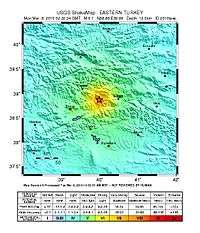2010 Elazığ earthquake
The 2010 Elazığ earthquake was a 6.1 Mw earthquake that occurred on 8 March 2010 at 02:32 UTC (04:32 local time).[3][4][5] The epicentre was Başyurt in Elazığ Province, in eastern Turkey. Initial reports in global media said as many as 57 people had died.[5] By 10 March, reports in the Turkish media placed the death toll at 41 and later, the death toll rose to 42.[6][7] Another 74 were injured, many after falling and jumping from buildings.[8][9] A stampede through the streets led to further injuries.[10]
 Istanbul | |
| UTC time | 2010-03-08 02:32:35 |
|---|---|
| ISC event | 14373453 |
| USGS-ANSS | ComCat |
| Local date | 8 March 2010 |
| Local time | 04:32 |
| Magnitude | 6.1 Mw[1] |
| Depth | 10 km (6.2 mi) [1] |
| Epicenter | 38.79°N 40.03°E [1] |
| Fault | East Anatolian Fault |
| Type | Strike-slip [2] |
| Areas affected | Turkey |
| Max. intensity | VI (Strong) [2] |
| Casualties | 42 |
The earthquake came one week to the day after the Turkish Chamber of Civil Engineers sent a report to parliament detailing inadequate building projects and the possibility that Istanbul would be destroyed by an earthquake, which could kill tens of thousands of people, at some point in the next three decades.[11]
Earthquake

The quake occurred on the East Anatolian Fault, a major transform fault which represents the boundary between the Anatolian Plate and the Arabian Plate.[12]
Damage
According to officials, most of the deaths occurred in three villages: Okçular, Yukarı Kanatlı and Kayalı.[5] At least five villages, though, suffered loss of life.[13][14] Villagers fled buildings, spending the night outside and lighting fires in the streets for warmth.[13]
Thirty houses collapsed in Okçular, and the death toll is at least 17.[5] Reports from the scene indicate "the village is totally flattened" and "everything has been knocked down – there is not a stone in place".[5][14]
At least 25 people died in Yukarı Demirci,[13] and emergency services went to Kovancılar.[15]
Many people used vehicles and taxis to drive to the hospital.[13] Most were asleep at the time the quake struck,[13] with four sleeping sisters perishing in one house.[16][17] Farm animals were also killed,[13] and minarets fell down.[16]
Aftershocks
Several aftershocks were felt, the strongest measuring 5.5 (at 09:47 local time), 5.1 (at 12:14) and 5.3 (at 13:12).[5][13][18][19][20] A total of over 20 aftershocks were counted within a short time following the quake.[16] Villagers were told to stay away from buildings for several days due to the potential of further aftershocks.[13]
Onur Tan et al. (2011) analyzed 2130 aftershocks (ML≥0.3) and reported in Geophysical Research Letters.
Response
![]()
![]()
![]()
References
- ISC (2016), ISC-GEM Global Instrumental Earthquake Catalogue (1900–2012), Version 3.0, International Seismological Centre
- USGS. "M6.1 - eastern Turkey". United States Geological Survey.
- "Başyurt-Karakocan (Elâzığ) 08.03.2010 04:32:31". Kandilli Observatory and Earthquake Research Institute, Boğaziçi University. 2010-03-08. Archived from the original on 2011-07-17. Retrieved 2010-03-09.
- "Magnitude 6.1 - EASTERN TURKEY". USGS. 2010-03-08. Archived from the original on 2010-03-11. Retrieved 2010-03-15.
- "Strong earthquake hits eastern Turkey". BBC News. 2010-03-08. Archived from the original on 8 March 2010. Retrieved 2010-03-09.
- "Elazığ depreminde ölü sayısı 10 kişi düştü". Hürriyet. 10 March 2010. Retrieved 10 March 2010.
- "Archived copy". Archived from the original on 2011-07-23. Retrieved 2010-03-14.CS1 maint: archived copy as title (link)
- "Strong quake in eastern Turkey kills 41". The Sydney Morning Herald. 8 March 2010. Retrieved 8 March 2010.
- "Death toll from Turkish quake climbing". news.com.au. 8 March 2010. Archived from the original on 10 March 2010. Retrieved 8 March 2010.
- Nick Iliev (8 March 2010). "Many dead in strong Turkey earthquake". The Sofia Echo. Archived from the original on 10 March 2010. Retrieved 8 March 2010.
- "Earthquake warning for Turkey". Al Jazeera. 4 March 2010. Archived from the original on 9 March 2010. Retrieved 8 March 2010.
- Mw 6.0 Basyurt-Karakocan (Eastern Turkey) on 08/03/2010 at 02:32 UTC European-Mediterranean Seismological Centre
- Burhan Ozbilici; Suzan Fraser (8 March 2010). "Survivors shiver in Turkey after quake kills 51". AP. Archived from the original on March 11, 2010. Retrieved 9 March 2010 – via Houston Chronicle.
- Sebnem Arsu (8 March 2010). "Quake Kills Dozens in Eastern Turkey". The New York Times. Retrieved 8 March 2010.
- "11 killed, over 20 injured in earthquake in Turkey". Xinhua News Agency. 8 March 2010. Retrieved 8 March 2010.
- Andy Jack (8 March 2010). "Deadly Earthquake Hits Eastern Turkey". Sky News. Archived from the original on 14 April 2010. Retrieved 8 March 2010.
- "Earthquake rocks eastern Turkey". Al Jazeera. 8 March 2010. Archived from the original on 8 March 2010. Retrieved 8 March 2010.
- "Başyurt-Karakocan (Elâzığ) 08.03.2010 09:47:38". Kandilli Observatory and Earthquake Research Institute, Boğaziçi University. 8 March 2010. Archived from the original on 23 March 2010. Retrieved 9 March 2010.
- "Başyurt-Karakocan (Elâzığ) 08.03.2010 12:14:23". Kandilli Observatory and Earthquake Research Institute, Boğaziçi University. 8 March 2010. Archived from the original on 23 March 2010. Retrieved 9 March 2010.
- "Gökdere-Palu (Elâzığ) 08.03.2010 13:12:10". Kandilli Observatory and Earthquake Research Institute, Boğaziçi University. 8 March 2010. Archived from the original on 23 March 2010. Retrieved 9 March 2010.
- "PM sympathizes with Turkish counterpart on massive earthquake". Associated Press of Pakistan. 9 March 2010. Archived from the original on 2012-03-04. Retrieved 9 March 2010.
- Turkey rejects Israel's offer of post-quake aid
External links
- Dozens dead from earthquake in Turkey – CNN
- The International Seismological Centre has a bibliography and/or authoritative data for this event.
- ReliefWeb's main page for this event.